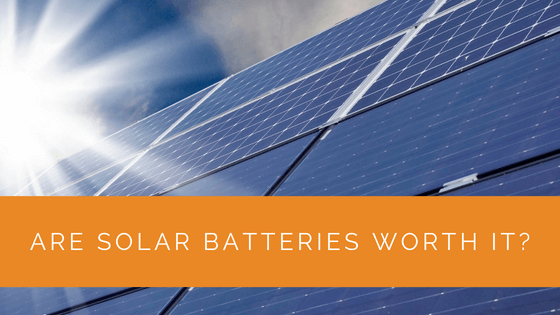
Solar batteries, also known as home energy storage systems, are gaining popularity among homeowners who want to maximize the benefits of solar power. These systems store surplus electricity generated by solar panels during the day for use at night or during outages. But is investing in a solar battery system worth it? This article will explore the advantages and disadvantages, the cost factors, and key considerations to help you decide if solar batteries are right for your home.
Contents
- 1 Key Takeaways
- 2 How Solar Batteries Work
- 3 Factors that Determine Solar Battery Cost
- 4 The Pros and Cons of Solar Batteries
- 5 Factors to Consider When Deciding on Solar Batteries
- 6 Case Study: Enhancing Energy Independence with Solar Batteries
- 6.1 Background
- 6.2 Project Overview
- 6.3 Implementation
- 6.4 Results
- 6.5 Summary
- 7 Expert Insights From Our Solar Panel Installers About Solar Batteries Worth
- 8 Discover the Power of Solar with Solar Panels Network
- 9 Conclusion
- 10 FAQ
- 10.1 How long do solar batteries last?
- 10.2 What factors influence the return on investment?
- 10.3 Is it worth getting a battery for my solar system?
- 10.4 How many batteries are needed to live off the grid?
- 10.5 Are solar batteries worth it?
- 10.5.1 About the Author
Key Takeaways
- Solar batteries store excess energy from solar panels, allowing homeowners to use it at night or during outages, increasing energy independence and potentially reducing utility bills.
- The cost of a solar battery system depends on several factors, including battery type, installation, and maintenance, making it important to evaluate before purchasing.
- When considering solar batteries, factors such as energy consumption, electricity costs, battery lifespan, and available incentives should all be taken into account.
How Solar Batteries Work
A solar panel system converts sunlight into electricity. During the day, when panels generate more power than needed, the excess can be stored in a battery instead of being sent back to the grid. This stored energy can then be used at night or during power outages, providing greater control over your energy usage.
There are two main types of solar batteries: lithium-ion and lead-acid. Lithium-ion batteries are more efficient, have a longer lifespan, and require less maintenance, but they come at a higher price. Lead-acid batteries are cheaper but tend to wear out faster and need more regular upkeep.

Factors that Determine Solar Battery Cost
The price of a solar battery system varies depending on the type of battery, system size, and installation costs. Lithium-ion batteries are typically more expensive than lead-acid ones, but their longevity and efficiency often justify the initial investment. Installation and maintenance costs should also be considered, as these can add up over time.
The Pros and Cons of Solar Batteries
Solar batteries offer several advantages, including energy independence and cost savings. They allow you to use stored solar power during peak hours or outages, reducing reliance on the grid. However, the upfront cost can be high, and batteries will eventually need to be replaced. Additionally, their storage capacity may not be sufficient for all households.

Factors to Consider When Deciding on Solar Batteries
Before installing a solar battery system, consider your energy usage patterns, electricity costs, and how much storage you need. If you use a lot of power at night or during outages, a battery could be beneficial. Also, compare the cost of batteries with other energy storage options like generators or grid-tied systems.
Finally, check for any local incentives or tariffs that could make the investment more attractive. Some utility companies offer net metering programs, which allow you to sell excess energy back to the grid, helping to offset the initial cost.
Case Study: Enhancing Energy Independence with Solar Batteries
Background
Solar Panels Network specializes in delivering tailored solar solutions to meet our customers’ unique needs. This case study highlights a residential project where we installed a solar battery system to improve energy independence and optimize renewable energy use.
Project Overview
We worked with a family looking to reduce their reliance on the grid and ensure a stable power supply during outages. After analyzing their energy usage, we recommended a combination of solar panels and a lithium-ion battery system.
Implementation
- Installation Process: The system included a 5 kW PV array and a 10 kWh lithium-ion battery. The setup was designed to meet the household’s evening and nighttime energy needs. We installed the panels on the roof and placed the battery in the garage for easy access.
- Technical Specifications: The lithium-ion battery was chosen for its durability, low maintenance, and long lifespan. A smart inverter managed the flow of energy between direct use, storage, and grid export.
- Maintenance Plan: We provided a comprehensive maintenance plan, including annual checks and software updates. The monitoring system allowed the homeowners to track energy usage in real-time.
Results
- Energy Independence: The system reduced the household’s reliance on grid electricity by 60%, providing power during outages and cloudy days.
- Financial Savings: The family saved approximately £800 annually on electricity bills by using stored solar energy.
- Environmental Impact: The system cut carbon emissions by about 2 tonnes per year, supporting the UK's renewable energy goals.
- Incentives: The Smart Export Guarantee (SEG) allowed the family to earn money by exporting surplus energy to the grid, improving the return on investment.
Summary
This case study demonstrates the value of combining solar panels with battery storage. The result was increased energy independence, significant financial savings, and a positive environmental impact. At Solar Panels Network, we’re committed to helping homeowners make informed decisions about solar energy.
Expert Insights From Our Solar Panel Installers About Solar Batteries Worth
Solar batteries offer a great way to achieve energy independence. They allow homeowners to store and use solar power whenever needed, making them a valuable investment, especially during outages.
Lead Solar Technician
Lithium-ion batteries are more efficient and require less maintenance, making them ideal for most homeowners despite their higher cost.
Senior Battery Installation Specialist
Considering solar batteries involves looking at long-term benefits. They can reduce reliance on the grid and lower electricity bills, especially in areas with high energy prices.
Chief Energy Consultant
Discover the Power of Solar with Solar Panels Network
Looking to harness the sun’s potential? Solar Panels Network is your trusted partner in the UK. We provide innovative solar solutions that help you save money, reduce your carbon footprint, and gain energy independence. Contact us today to start your solar journey.
Conclusion
Solar batteries can be a great option for homeowners seeking energy independence and cost savings. However, it's important to evaluate factors like cost, electricity prices, and battery lifespan before making a decision. By considering all these aspects, you can determine whether a solar battery system is a worthwhile investment for your home.
FAQ
How long do solar batteries last?
Solar batteries typically last between 10 to 15 years, depending on the type and usage. Lithium-ion batteries tend to last longer than lead-acid ones.
What factors influence the return on investment?
The return on investment for a solar battery system depends on electricity costs, available incentives, battery lifespan, and your energy consumption patterns.
Is it worth getting a battery for my solar system?
It depends on your energy needs. If you use a lot of power at night or during outages, a battery could be a good investment. However, if electricity is cheap in your area, it might not be as beneficial.
How many batteries are needed to live off the grid?
The number of batteries required depends on your energy usage and the storage capacity of the system. Off-grid homes usually need multiple batteries to cover energy demands during low sunlight periods.
Are solar batteries worth it?
Whether or not solar batteries are worth it depends on your specific situation, including energy usage, electricity costs, and the availability of incentives. Carefully evaluating these factors will help you make an informed decision.
About the Author
Solar Panels Network is a leading provider of solar energy solutions in the UK. Our team of experts delivers high-quality installations and tailored advice to help homeowners and businesses embrace renewable energy. Our content is crafted by industry professionals to give you accurate, actionable insights into solar technology and its benefits.
Helical Gear,Right Angle Bevel Gear Reducer,Bevel Gear Spur Gear Ductile Iron,Forging Bevel Pinion Axle Bevel Gear
Taizhou Hongxiang Power Machinery Co.,Ltd , https://www.hxcamshaft.com